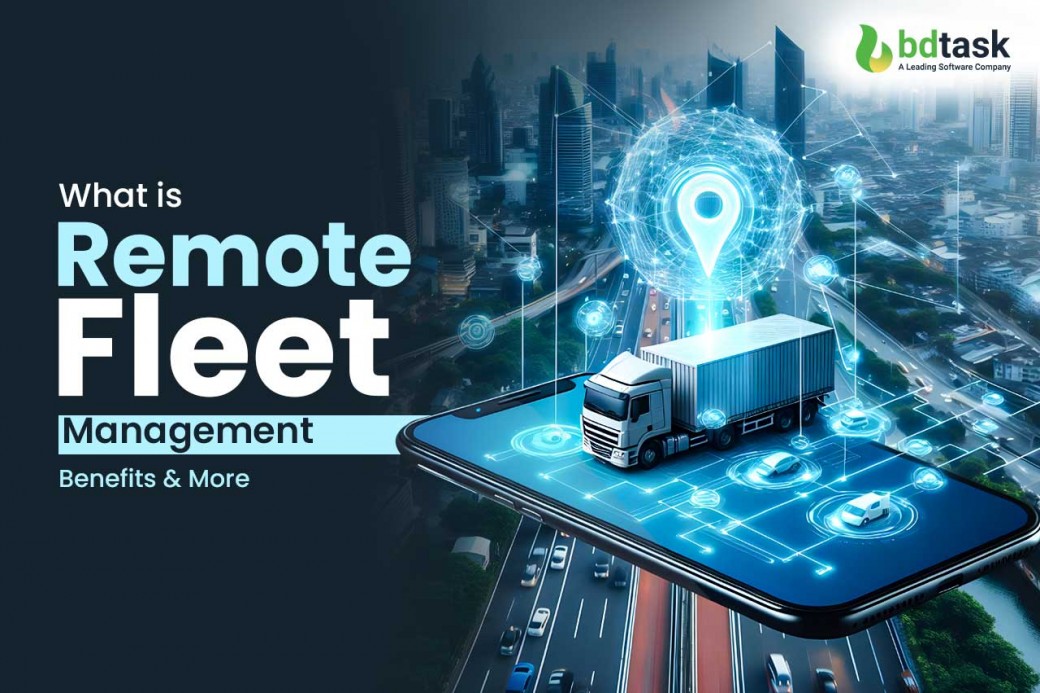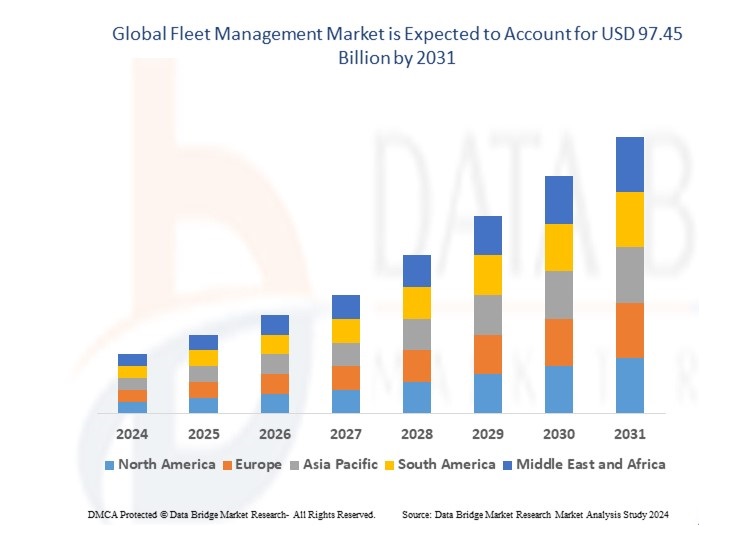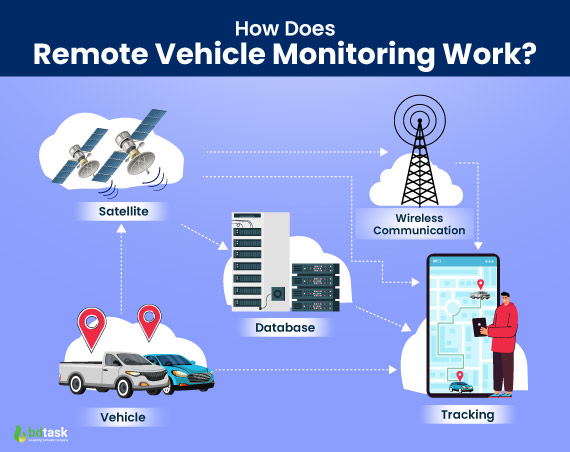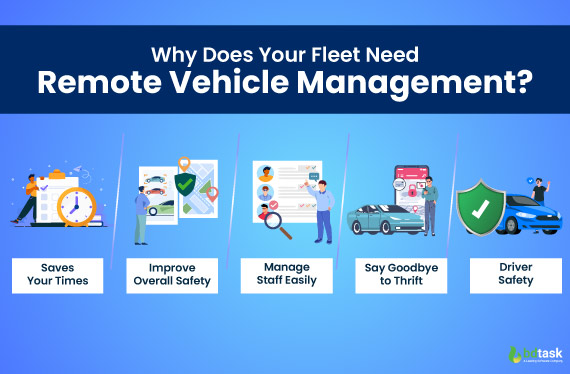What is Remote Fleet Management - Benefits & More

Remote fleet management has become the future of the fleet industry. Obviously, technology is upgrading daily. In fleet operation, fleet managers monitor cars while they are in the field. But the times have changed. Remote fleet management changes the way of working. It gives more compact, more efficient results in your day-to-day operations.
Remote fleet management improves overall productivity and also saves valuable time.
In this blog, we will learn about remote fleet management, how it works, and how it benefits a fleet company. Most importantly, we will also find out how a fleet manager benefits from it.
So, let's start.
What is Remote Fleet Management?
Remote fleet management is a powerful tool for fleet managers to track the overall activity of the fleet. With its help, monitoring the maintenance status of any vehicle is easily noticeable.
Remote fleet management helps companies access real data through an online portal and review the total performance of the fleet.
You can compare remote fleet management to a bird's eye because It gives a total of 360 views of your fleet. You can get updates on your fleet easily.
Let's make it clear. Imagine a bus or truck fleet operating in densely populated urban areas that requires regular maintenance to prevent service disruptions.
So, if you have a remote start fleet management system in your company, it's too easy to Monitor each bus engine's performance.
In Research, it is ensured that the fleet management market increasing day by day. Not only in Asia but all over the world is rapidly growing.

Source - databridge market research
How Does Remote Vehicle Monitoring Work?
These systems use a mixture of hardware and software components to collect and analyse data in real time. They enable fleet managers to make informed decisions and improve efficiency. Here's how they work.

Step 1
The first step in implementing a remote fleet management system involves installing hardware devices, such as
- GPS trackers
- Onboard diagnostic devices (OBD)
- Sensors
It's responsible for collecting data related to the vehicle location, speed, fuel consumption, engine health, and other relevant parameters.
Step 2
Once installed, the hardware devices transmit the collected data to a centralised server using wireless communication technologies like
- Cellular networks
- Satellite communication
It ensures that fleet managers have access to real-time information about their vehicles' whereabouts and performance.
Step 3
The vehicle management software then processes and analyses the data received from the vehicles. Advanced algorithms and analytics tools identify patterns, trends, delivering valuable insights into fleet operations.
Step 4
Fleet managers can access the fleet management software through a web-based dashboard or cloud-based fleet mobile application. From there, they can monitor each vehicle's location, status, and behaviour in real-time. This includes tracking routes, monitoring driver behaviour, and receiving alerts for events such as speeding, idling, or maintenance issues.
Step 5
Remote fleet management systems often integrate with other business systems, including inventory management, dispatching, and accounting software, to streamline operations further. These systems are designed to scale with the fleet's growing needs, accommodating additional vehicles and functionalities as required.
Why Does Your Fleet Need Remote Vehicle Management?

There are various ways through which remote fleet management helps a fleet business, and some of them are listed below
1. Saves Your Times
We are all related to a proverb that says time is a precious commodity, and the tide waits for none. So, in every business, time is a very precious thing. If you are a fleet manager, then you have many fleet responsibilities. Every day, you have to do a lot of work, like checking up on every vehicle's details.
Remote fleet vehicle management saves valuable time for fleet managers by providing instant access to critical data.
With real-time monitoring capabilities, managers can quickly identify problems and make informed decisions to optimise fleet performance.
Another advantage of remote fleet management is you don't need to wait for manual reports. Fleet Managers can access up-to-date information on vehicle locations, health status, and driver behaviour from any location.
It improves all the administrative tasks, such as
- Compliance reporting
- Scheduling maintenance
- Tracking fuel expenses
Thus ultimately freeing time for managers to focus on strategic planning and business growth.
2. Improve Overall Safety
Safety is important in fleet operations, where drivers are constantly on the road facing various problems and risks.
Remote vehicle management systems play an important role in promoting driver safety through features such as
- GPS tracking
- Driver behaviour monitoring
- Real-time alerts
GPS tracking enables managers to monitor vehicle locations at all times. Driver behaviour monitoring tools analyse factors such as
- Speed
- Acceleration
- Harsh braking
It allows managers to identify risky driving patterns and provide targeted coaching or training.
By prioritising safety through remote vehicle management, fleets can reduce accidents, mitigate liability risks, and protect both drivers and assets.
3. Manage Staff Easily
In fleet business, staff management is tough work to do. As a fleet manager, you have to deal with many things. So, every day, check on everything to ensure that everything is working fine. Sometimes fleet admins need to be more relaxed to deal with other work.
If you have this remote fleet management option, it's easy to monitor employees from anywhere. With this function, it is easy to check which driver drives which vehicle. You can monitor the working shift, idling time, speeding, trip duration, etc.
4. Say Goodbye to Thrift
Fleet operators always prioritise fleet security. They must safeguard valuable assets and mitigate the risk of theft or unauthorised access.
Remote vehicle management systems incorporate advanced security features, providing multiple layers of protection against theft and unauthorised use. One option is Vehicle immobilisation. It allows fleet managers to remotely turn off the engine in the event of a theft or security breach, preventing the vehicle from being driven away.
5. Driver Safety
A key benefit of remote monitoring for fleets is driver safety. By staying on top of maintenance and responding quickly to developing problems in the various systems, fewer breakdowns put drivers in unsafe or uncomfortable situations.
Remote monitoring gives fleet managers real-time updates on deliveries across the enterprise. If drivers encounter any issues in their vehicles, admins can track them down immediately. As a result, it takes less time to recover the problem and secure the safety of drivers.
It allows them to plan the most efficient routes for drivers based on availability, traffic, weather, and more. It reduces the likelihood of missed deliveries, unnecessary wait times, or breakdowns that affect a driver's ability to get home for the day.
Endnote
As the competition is continuously growing, your business needs to remain at the top of the market. So, a proper and perfect system is all you need to remain on top. Remote fleet management is your perfect companion. A fleet business can only achieve the desired performance with remote fleet management.











